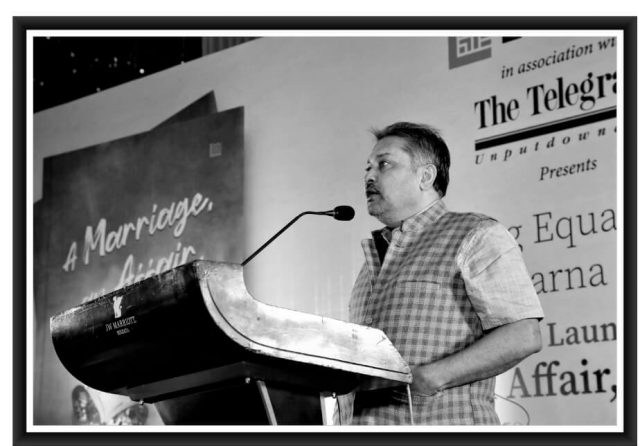Sabarna Roy is Senior Vice President [Business Development] at Electrosteel Castings Limited, an author of eight Literary and three Technical bestselling books, TEDx Speaker, Champions of Change Award 2020 Winner, Times Excellence Award 2021 Winner in Indian Literature, and Golden Glory Award Winner for Critically Acclaimed Bestselling Author of the Year 2021. Sabarna Roy has been selected among the India Today Group: Icons of India. Presently, he is writing his ninth Literary work: an epistolary novel, which is likely to be published in the winter of 2022/23.
An Interview with Author Sabarna Roy where he talks about his journey as an author and his love for writing. He explains about his motivation and shares his life experiences.
1. Describe your journey so far as an author.
I started keeping diaries and journaling since the age of fourteen. It was as if a ritual with me. I wrote about everyday events; what happened at school; the films I watched; the books I read; the delicacies that I ate; the cricket matches that I played; conversations with my parents, school teachers, and friends; the places that I travelled with my parents; my moments of sadness, boredom, and elation, and so many other things. These diaries and journals over the years inflated like novels – as if written in a stream of consciousness. My first published book was an anthology of twenty English poems, titled: Pain, published in 1986 with a gift of rupees two hundred from my mother that sold in Jadavpur University, Presidency College and St. Xavier’s College in Calcutta like hot cake.
After I joined the Corporate sector, I wrote on and off in Bengali and English and published some of my poems in renowned literary journals in Calcutta. In 1994, I wrote a play in Bengali, titled: Ajante, which was later published in the annual journal of Bohurupee in 2010. Between 2002 and 2005, I became an oral storyteller among my friends, colleagues, and relatives, a habit which I started with a lot of passion but gradually waned with time. In 2007, I started writing seriously for pursuing my second profession apart from being a senior engineering professional. My first book Pentacles was published in 2010. Thereafter, I continued producing books-after-books both in the literary format as well as in the technological format.
My literary works published so far are: Pentacles; Frosted Glass; Abyss; Winter Poems; Random Subterranean Mosaic: 2012 – 2018; Etchings of the First Quarter of 2020; Fractured Mosaic, and A Marriage, an Affair, and a Friendship.
I have three technical books to my name, titled: (i) Articles on Ductile Iron Pipelines and Framework Agreement Methodology, (ii) Technological Trends in Water Sector for a Sustainable Solution, and (iii) Emerging Environmental Technologies and Policies.
2. Tell us something about your new book: A Marriage, an Affair and a Friendship.
A Marriage, an Affair, and a Friendship is a crisp, fast paced cocktail of different perspectives of an open marriage told from the point of view of Rahul, Paromita, his wife, Suroma, the ‘other’ woman, and Samaresh, the ‘silent’ eager paramour. The narration weaves in and out of their points of view as they are confronted with different challenges, including the moral judgement of their sons, Proloy and Ratul.
3. What keeps you motivated and focused on your writing.
The inspiration, to understand life in general, human life’s existence with respect to the universe and my life specifically, keeps me motivated and focused on my writing.
4. Do you view writing as a spiritual practice.
No, I do not view writing as a spiritual practice. I view writing as physical and intellectual toil that leaves one drained in the end and yet strangely satiated.
5. What role does imagination plays in writing books?
Well, imagination is what ignites our memories, and imagination gradually builds up our intuition to understand the future and, as such, affects in writing books automatically.
6. Who is your favourite author?
There are many, many authors that I read. However, I will name a few: Fyodor Dostoyevsky, Leo Tolstoy, Anton Chekov, Albert Camus, Eugene Ionesco, T S Eliot, Osip Mandelstam, Orhan Pamuk, Milan Kundera, Haruki Murakami, J M Coetzee, Rabindranath Tagore, R K Narayan, Ruskin Bond, Upamanyu Chatterjee, and Mahesh Dattani. The novels that have deeply impacted me are: Anna Karenina, Dakghar [The Post Office], The Outsider, Snow, The Unbearable Lightness of Being and The Life & Times of Michael K.
7. Share your advice to all the aspiring authors of India.
I can give a few tips, which can work remarkably well for aspiring authors and poets: –
Maintain a journal or a diary for yourself. This is a tool where you can talk to yourself most privately, and later your journal or your diary will reflect back the way you have progressed in life.
Read as much as you can and reflect upon what you are reading. Also, jot down your book reviews, however brief they are, in your journal or diary.
Capture all your thoughts, ideas, and dreams and let them flow through you in the form of written pieces in your journal or diary.
If you are inclined enough, create and maintain a regular blog and socialize it among your friends, family, and relatives and seek their opinion about what you are writing. This is a process from where you will learn.
Try to be original and authentic, however immature you are, because in being close to yourself, you will reconnect with your soul during the process of writing. This is very critical and significant to become a good author or a poet.
8. What does literary success look like to you?
Literary success to me is when readers come up to me and say that how my books have affected their lives in certain ways. These kinds of conversations are deeply fulfilling.
Read more






























